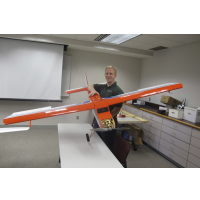North Dakota: The State that Loves Drones
 University of North Dakota student Logan Lass with a training drone (photo: Dave Kolpack, AP)
University of North Dakota student Logan Lass with a training drone (photo: Dave Kolpack, AP)
A few states, such as Utah and Wisconsin, have adopted legislation meant to curb the use of drones to spy on their residents. Many more states are considering such legislation. But not North Dakota. That state has no rules regulating drones, and law enforcement agencies there are taking advantage of the situation.
The first known incident of a drone-aided arrest took place in North Dakota in 2011 when farmer Thomas Brossart was taken into custody after he refused to return some cows that had wandered onto his property.
The Grand Forks sheriff and police departments, in cooperation with the University of North Dakota, are now using drones on a regular basis, according to Stateline. Since May 2013, there have been nine instances in which drones have been used in the Grand Forks area. They include searching a flooded river for drowning victims, photographing a train collision, photographing river bank erosion and damage to historic buildings, searching for two suspects accused of auto theft and child molestation and taking photos of an outdoor murder scene.
The university’s connection with the drone program comes because of its history of training airline pilots in its aerospace program. That program has expanded to include the training of drone pilots. Associate professor Alan Frazier runs the drone program. When law enforcement wants to use a drone, Frazier makes the arrangements with the Federal Aviation Administration (FAA) and he or another pilot operates one of four drones available.
The university specified five situations in which drones may be used: to search for lost people; to perform post-disaster assessments; to photograph crime and accident scenes; to search for crime suspects who pose a risk to public safety; and to assist with traffic control at major events.
Frazier said he sees no need for a warrant to authorize use of drones. “Drones don’t do anything that aircraft can’t already do. It’s not a drone concern–it’s an information technology concern. The real concern is what’s happening with that data.”
The American Civil Liberties Union (ACLU) is also concerned about where that data ends up. “The trick is, we need a system of rules to ensure we can enjoy the benefits of drone technology without becoming a surveillance society,” said Allie Bohm, advocacy and policy strategist for the ACLU. “We want to prohibit drones for massive surveillance and still allow law enforcement to use them in cases of wrongdoing.” The ACLU supports the warrant requirements some states have enacted.
North Dakota sees the drones not merely as a way to gather data, but as a job-creation tactic. The Association for Unmanned Vehicle Systems International estimates that the state will see 105 jobs created in the drone industry.
-Steve Straehley
To Learn More:
Balancing Privacy, Jobs in Drone Debate (by Sandy Johnson, Stateline)
Homeland Security Quietly Runs “Loan-a-Drone” Program for Local Law Enforcement (by Noel Brinkerhoff, AllGov)
- Top Stories
- Unusual News
- Where is the Money Going?
- Controversies
- U.S. and the World
- Appointments and Resignations
- Latest News
- Musk and Trump Fire Members of Congress
- Trump Calls for Violent Street Demonstrations Against Himself
- Trump Changes Name of Republican Party
- The 2024 Election By the Numbers
- Bashar al-Assad—The Fall of a Rabid AntiSemite






Comments